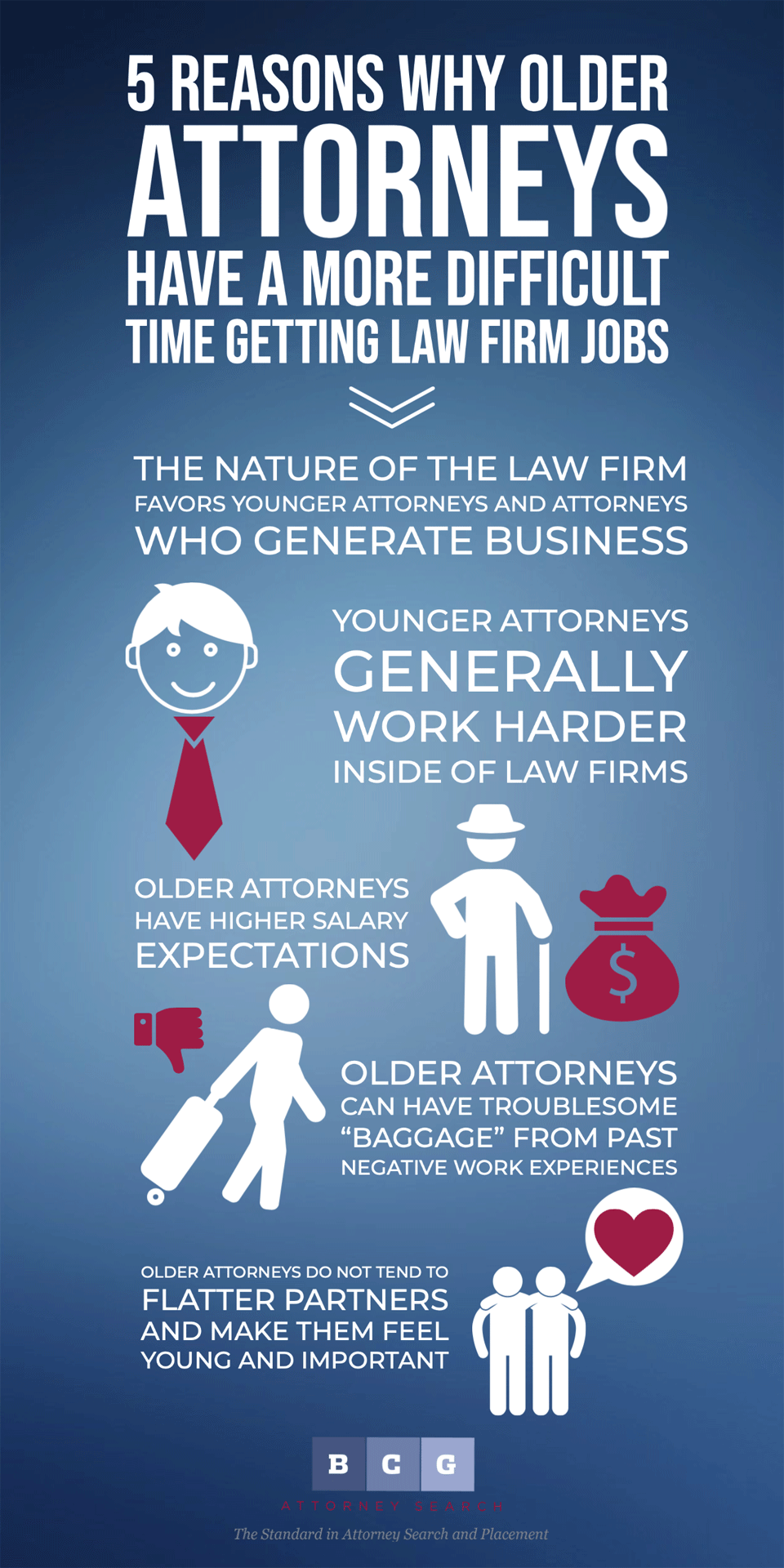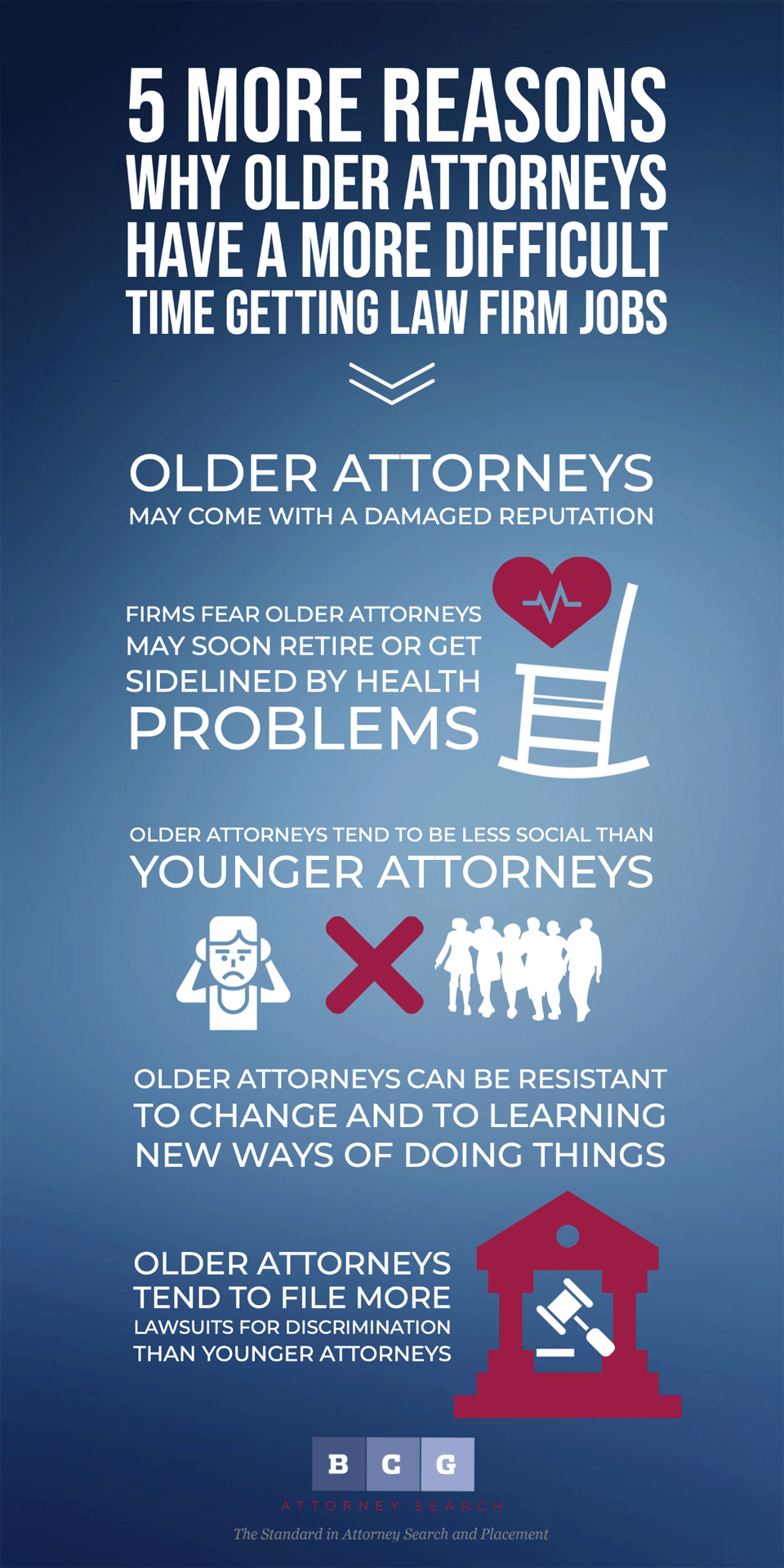
When I first started practicing as a legal recruiter, I was amazed at how difficult it was for older attorneys to find jobs. Partners from major American law firms would frequently call me and express an interest in moving to a different law firm. The problem was that most of these attorneys did not want to switch firms, but they had no choice as they were being "forced out" of their current firms.

|
| Harrison Barnes |
In one case, I remember an attorney from one of the ten largest law firms in the country who was labeled as a "partner" and yet was making the same amount of money as a second-year associate. I saw many examples of this sort of thing taking place the longer I worked as a recruiter. One particularly egregious example was when I saw a large Los Angeles law firm offer an unemployed real estate partner a salary that was one-half of the amount a first-year associate at that firm would receive.
"Are you kidding?" I asked the law firm.
"No, we are quite serious," they said.
"Why?" I asked. "That's humiliating."
"We're paying him that because we know that he will take it, and we are the only firm that is going to hire him."
To my astonishment, the partner took the job.


While experience, seasoning, and maturity certainly tend to make older attorneys better lawyers in important respects, when it comes to getting jobs it is very, very tough being an older attorney. In this article, I elucidate the reasons why it is incredibly difficult for older attorneys to find work and offer suggestions about how to overcome the obstacles. I focus on law firm positions, as that forms the majority of my placement activity as a legal recruiter.
1. The Nature of the Law Firm Favors Younger Attorneys and Attorneys Who Generate Business
Law firms are businesses that operate profitably by hiring younger, less expensive attorneys to do the work. But law firms also are institutions that need business to survive and grow and therefore older attorneys who generate business are always employable. I've seen attorneys in their early 80's move to firms because of their ability to bring in business. While some firms have a mandatory age for retirement, not all do.
Law firms only exist due to paying clients. The people who do the work are a cost center that takes away from the profits of the law firm. Senior attorneys who do not bring in business are a cost center for law firms as they traditionally have much higher billing rates than junior attorneys.
These higher billing rates hurt older attorneys in the following ways:
First, if a senior attorney has a high billing rate, clients are more likely to scrutinize their bills and not pay them. A senior attorney with 20 years of experience might bill at a rate of $725 an hour compared to a junior associate's rate of $250 an hour. As a result of significantly higher compensation for senior attorneys, law firms prefer to give as much work as possible to younger attorneys with lower billing rates because the bills then look better and more manageable to clients.
While it might seem logical, in theory, that law firms could bill the work of a 20-year attorney at a lower rate to make their presence more palatable, this is not how it works at law firms in practicality. Law firms, almost without exception, "bill out" attorneys based on their level of experience.
Second, because there is a limited amount of work available at law firms that clients are willing to pay high billing rates for, most partners prefer to do this work directly for their own clients (rather than giving the work to someone else inside the firm). The reason is because most law firm compensation systems function so that partners receive a higher percentage of the work they do for their own clients as opposed to other partners' clients. Thus, if a partner does the work for his or her own client and bills at $800 an hour, the partner might receive 30% (or $240 per hour) of that billing rate as direct compensation. Conversely, if the partner gives the work to someone else in the firm, he or she might only receive $120 for each hour of work. Thus, it is in many partners' best interests to do the work for their clients and not delegate it out to other partners or associates.
2. Younger Attorneys Generally Work Harder Inside of Law Firms
Younger attorneys are a fixed cost. Thus, they cost the law firm the same amount of money whether they work 1,500 hours or 3,000 hours. While a law firm may pay a larger bonus to an attorney who works 3,000 hours, the cost is negligible from the firm's perspective.
When I was working at a law firm, I was routinely billing 70 to 80 hours a week. Staying up all night and working long hours is something that young people do because they desperately want to get ahead. They typically do not know their limitations, do not understand how the business world works, and do not realize that there may not be a lot of opportunities for them at the firm in the future no matter how hard they work.
One attorney I know billed at least 3,500 hours a year at a major law firm for seven years and then quit before making partner.
Law firms are not usually surprised or upset when young attorneys, who have helped make the firm millions of dollars in profit, become tired, burned-out, or exhausted and subsequently decide to leave the firm and work elsewhere. In fact, this is a normal part of the process.
Generally speaking, younger attorneys can be pushed very hard, will work hard, are hungry and want to impress. Partners like having them around because they can rely on them to bill lots of hours and make the firm money. Clients also are more receptive to having young attorneys work on their cases because of their lower billing rates.
In contrast, after nearly ten years of working crazy hours, more senior attorneys are unlikely to work as hard as they did to get to their current positions (unless they are partners getting significant percentages of the amount they are billing). Many experienced attorneys who have been working for 10+ years are not going to be too motivated to work 2,500 hours a year for even $300,000 in salary.
In my career, I have encountered several extremely hard-working senior attorneys, but I have seen far more extremely hard-working junior attorneys. An attorney's productivity typically declines with age.
3. Older Attorneys Have Higher Salary Expectations
Attorneys with 15+ years of experience expect to earn much more in salary than younger attorneys who are being hired right out of law school. While many senior attorneys are more than happy to take a position that pays what a junior attorney makes, this is not a dynamic that is conducive to the success of a law firm. The law firm suspects and worries that the senior attorney may resent having to take what the attorney perceives to be a pay cut. The firm also assumes that the senior attorney may leave when a better job becomes available and, as a result, may spend a significant amount of time searching for a job instead of being committed to his or her (lower-paid) position.
After I was out of law school a few years, I took a position in the Los Angeles office of a major New York law firm. I had gone to this firm initially because they doubled my salary over what my then-current firm (a major Los Angeles law firm) was paying me. Like many New York firms, this firm had come to Los Angeles in the 1980s because they believed that they needed to be closer to Japan - which was widely perceived as a powerful economic market primed for global economic dominion.
The law firm grew by acquiring partners from a variety of firms around Los Angeles and offering them huge salaries. The money that was being generated by the firm from working for huge financial institutions in New York was used to hire partners in Los Angeles and overpay them significantly. For example, a partner who might have been making $200,000 at a local Los Angeles firm was offered $450,000. The partners who were being hired were not worth what they were being paid by any stretch of the imagination.
It took until the late 1990s for the law firm to recognize that paying these exorbitant salaries was unsustainable and, as a result, the firm started forcing out partners and letting them go. I represented several of them when I became a legal recruiter and helped them secure jobs.
The problem with all of these partners was that most of them did not generate business for the firm. They had been hired as partners and paid high salaries according to a structure that made very little sense. Most of them could not believe the market would only pay them a fraction of what they were earning in their prior jobs. Rather than take a job with a firm where they were "unfairly paid," several of these older attorneys made the monumental mistake of joining forces to start their own firms.
It did not work out that well for them.
When it comes to senior attorneys, the reality is that law firms know that if they pay them less, or give them a less important title, the attorneys may not stick around.
4. Older Attorneys Can Have Troublesome "Baggage" from Past Negative Work Experiences
Older attorneys often come with "baggage" associated with disappointments suffered over their careers. Many have been let go from other law firms and have had various issues and frustrations. Many are angry as a result and are thus unenthusiastic and pessimistic about their career prospects for the future.
When an attorney has "been around the block," the attorney is less likely to have the same level of enthusiasm as a younger attorney. Firms avoid hiring people whom they believe will bring frustration and a lack of enthusiasm to the workplace, as this can breed negative energy and poison the environment for everyone else working there.
5. Older Attorneys Do Not Tend to Flatter Partners and Make Them Feel Young and Important
At almost every law firm in the country, the most respected older partners almost always have younger attorneys working directly for them. These younger attorneys ask a lot of questions and give the older attorneys the opportunity to feel important. They also give the older attorneys the opportunity to show these younger attorneys the ropes and be their mentors throughout the process.
Older attorneys, in contrast, already "know everything." They are unlikely to get emotional, ask questions, or be "impressed" easily with another attorney. Thus, an older attorney may quite literally not enjoy his or her day at work as much with another older attorney around. (Please do not attack the messenger, but I have seen more relationships and affairs between older attorneys and younger ones than I can count. A fifty-year old partner in a dead end marriage is more likely to be interested in hiring a younger "available" attorney in her late 20s than he is apt to hire a woman in her late 40s. This may not always be the case, of course, but it often is, especially because attorneys spend so many hours at work with co-workers intensively tackling cases, deals and projects for clients.)
6. Older Attorneys May Come with a Damaged Reputation
The longer an attorney has been around, the more likely it is that his or her reputation will be blemished due to previous negative experiences with clients and the more likely it is that the attorney will have a bad reputation. In contrast, a young attorney with a "fresh slate" is not likely to have any damage to his or her reputation.
It is not uncommon for an attorney to do something wrong at some point in his or her career. It could be any number of things - blowing a huge deal, insubordination, disrespecting a superior, missing a deadline, or choosing the wrong side in an internal, political dispute at the firm. Law firms typically do not hire attorneys who have issues in their pasts, including sanctions, malpractice claims, or any other disciplinary action by the state bar.
Additionally, if an older attorney has moved around a lot, law firms might infer that the attorney is either incompetent or undisciplined. For example, if an attorney is 20 years out of law school and has worked at numerous firms and never made partner, a law firm may look upon that attorney a bit suspiciously and be less inclined to hire him or her.
See Top 30 Factors Large Law Firms Consider When Hiring Lateral Attorneys for more information.
7. Firms Fear Older Attorneys May Soon Retire or Get Sidelined By Health Problems
A law firm does not want to hire people, train them and promote them through the ranks if the perception is that they may soon retire or suffer from a debilitating illness or health condition in the future. Firms would rather hire a younger person who hopes to spend his or her entire career at the firm and is likely to work for an extended period of time before leaving or getting sick.
I have noticed when I interview older attorneys that they often talk about how they "got sick" at some point in their careers. While there is nothing wrong with being sick, this topic of conversation is generally not well received by employers who may be worried that older attorneys will more likely to be on sick leave or otherwise absent for an extended period of time while on payroll.
Because of sickness, age, or attrition, older attorneys on average tend to miss work more often. As a result, law firms are much more reticent about hiring older attorneys over younger attorneys.
8. Older Attorneys Tend to Be Less Social and Have a Less Contemporary "Vibe" Than Younger Attorneys
Younger attorneys are often excited about starting their new careers and enjoy cultivating camaraderie with their fellow associates. They like to go out after work with co-workers, socialize, and have fun. In contrast, older attorneys tend to be more independent and merely want to go home after being finished with a long day of work. Firms tend to think that social ties built by younger attorneys are a positive force for the firm and add to the health of the institution.
Moreover, many attorneys in hiring positions at law firms tend to make hiring decisions based on whether a job candidate is someone they could envision socializing with on a routine basis. This often disadvantages older attorneys because they are more likely to avoid "going out for drinks" after work because of a desire to be home with their families.
There also are generational differences that make it harder for senior attorneys and younger attorneys to understand each other. These generational "mismatches" are something that law firms take into account and an older attorney who seems to be in touch with the younger generation will have an edge in getting hired.
9. Older Attorneys Can Be Resistant to Change and to Learning New Ways of Doing Things
Older attorneys often have various methods of doing things that they have been following most of their careers. Habits can be hard to break and many older attorneys are resistant to change. In the litigation context, for example, senior attorneys may instinctively file a certain type of motion or, in the corporate context, may be committed to doing a deal a certain way. This notion of older attorneys sticking to their habits is often frustrating to law firms, as firms often want to innovate and need to have the confidence that all of their attorneys are working in the same way according to "firm norms."
When I was practicing law, I recall attorneys in my firm in their 60's and 70's who did not even use computers. They had their secretaries print off their emails and had the secretaries sit there while they dictated their responses. While I thought this was "charming" to some extent, a lack of technological savvy actually held these attorneys back and slowed the efficiency of the firm because the secretaries were wasting time having to take dictation on behalf of the older attorneys.
Today, most attorneys can use computers, but firms fear that older attorneys may be resistant to other technological advances that have become essential to the practice of law. Technologies, applications and devices are always changing and it is important for all attorneys in a given firm to be able to keep up with the pace of change and function well in a technologically sophisticated and evolving environment.
10. Older Attorneys Tend to File More Lawsuits for Discrimination Than Younger Attorneys
When a young attorney is fired, he or she may be out of work for a matter of days or weeks. An older attorney, on the other hand, may never find a job again. Due to how difficult it is for an older attorney to find a new job, firms may fear that older attorneys who are fired or laid off might decide that it is in their best interest to file a lawsuit alleging age discrimination. Law firms are risk averse and do not want to expose themselves to this type of problem.
Older attorneys sue law firms much more frequently than younger attorneys. Therefore, it is often riskier for the law firm to hire older attorneys out of a fear that, if they are forced to fire the older attorney, that attorney may claim his or her termination was based on age discrimination.
Have you personally seen age discrimination in a law firm? If so, share what you saw.
There are numerous jobs out there for older attorneys, and it is not impossible to find them. But because law firms tend to favor younger attorneys, older attorneys must be aware of the hurdles and find creative ways around them. To increase the chances of getting hired by a law firm as an older attorney, an attorney should strive to
While it is not easy to get hired as an older attorney, it is certainly not impossible. Following these guidelines can maximize the chances for success!
1. The Nature of the Law Firm Favors Younger Attorneys and Attorneys Who Generate Business
Law firms are businesses that operate profitably by hiring younger, less expensive attorneys to do the work. But law firms also are institutions that need business to survive and grow and therefore older attorneys who generate business are always employable. I've seen attorneys in their early 80's move to firms because of their ability to bring in business. While some firms have a mandatory age for retirement, not all do.
Law firms only exist due to paying clients. The people who do the work are a cost center that takes away from the profits of the law firm. Senior attorneys who do not bring in business are a cost center for law firms as they traditionally have much higher billing rates than junior attorneys.
These higher billing rates hurt older attorneys in the following ways:
First, if a senior attorney has a high billing rate, clients are more likely to scrutinize their bills and not pay them. A senior attorney with 20 years of experience might bill at a rate of $725 an hour compared to a junior associate's rate of $250 an hour. As a result of significantly higher compensation for senior attorneys, law firms prefer to give as much work as possible to younger attorneys with lower billing rates because the bills then look better and more manageable to clients.
While it might seem logical, in theory, that law firms could bill the work of a 20-year attorney at a lower rate to make their presence more palatable, this is not how it works at law firms in practicality. Law firms, almost without exception, "bill out" attorneys based on their level of experience.
- See Don't Let Your Rising Billing Rate Push You Out the Door for more information
Second, because there is a limited amount of work available at law firms that clients are willing to pay high billing rates for, most partners prefer to do this work directly for their own clients (rather than giving the work to someone else inside the firm). The reason is because most law firm compensation systems function so that partners receive a higher percentage of the work they do for their own clients as opposed to other partners' clients. Thus, if a partner does the work for his or her own client and bills at $800 an hour, the partner might receive 30% (or $240 per hour) of that billing rate as direct compensation. Conversely, if the partner gives the work to someone else in the firm, he or she might only receive $120 for each hour of work. Thus, it is in many partners' best interests to do the work for their clients and not delegate it out to other partners or associates.
- See The BCG Attorney Search Guide to Basic Law Firm Economics and the Billable Hour: What Every Attorney Needs to Understand to Get Ahead for more information.
2. Younger Attorneys Generally Work Harder Inside of Law Firms
Younger attorneys are a fixed cost. Thus, they cost the law firm the same amount of money whether they work 1,500 hours or 3,000 hours. While a law firm may pay a larger bonus to an attorney who works 3,000 hours, the cost is negligible from the firm's perspective.
When I was working at a law firm, I was routinely billing 70 to 80 hours a week. Staying up all night and working long hours is something that young people do because they desperately want to get ahead. They typically do not know their limitations, do not understand how the business world works, and do not realize that there may not be a lot of opportunities for them at the firm in the future no matter how hard they work.
One attorney I know billed at least 3,500 hours a year at a major law firm for seven years and then quit before making partner.
Law firms are not usually surprised or upset when young attorneys, who have helped make the firm millions of dollars in profit, become tired, burned-out, or exhausted and subsequently decide to leave the firm and work elsewhere. In fact, this is a normal part of the process.
Generally speaking, younger attorneys can be pushed very hard, will work hard, are hungry and want to impress. Partners like having them around because they can rely on them to bill lots of hours and make the firm money. Clients also are more receptive to having young attorneys work on their cases because of their lower billing rates.
In contrast, after nearly ten years of working crazy hours, more senior attorneys are unlikely to work as hard as they did to get to their current positions (unless they are partners getting significant percentages of the amount they are billing). Many experienced attorneys who have been working for 10+ years are not going to be too motivated to work 2,500 hours a year for even $300,000 in salary.
In my career, I have encountered several extremely hard-working senior attorneys, but I have seen far more extremely hard-working junior attorneys. An attorney's productivity typically declines with age.
- See Why Attorneys with 5+ Years of Law Firm Experience Are in Serious Trouble (and Seven Steps They Need to Take to Save Their Legal Careers) for more information.
3. Older Attorneys Have Higher Salary Expectations
Attorneys with 15+ years of experience expect to earn much more in salary than younger attorneys who are being hired right out of law school. While many senior attorneys are more than happy to take a position that pays what a junior attorney makes, this is not a dynamic that is conducive to the success of a law firm. The law firm suspects and worries that the senior attorney may resent having to take what the attorney perceives to be a pay cut. The firm also assumes that the senior attorney may leave when a better job becomes available and, as a result, may spend a significant amount of time searching for a job instead of being committed to his or her (lower-paid) position.
After I was out of law school a few years, I took a position in the Los Angeles office of a major New York law firm. I had gone to this firm initially because they doubled my salary over what my then-current firm (a major Los Angeles law firm) was paying me. Like many New York firms, this firm had come to Los Angeles in the 1980s because they believed that they needed to be closer to Japan - which was widely perceived as a powerful economic market primed for global economic dominion.
The law firm grew by acquiring partners from a variety of firms around Los Angeles and offering them huge salaries. The money that was being generated by the firm from working for huge financial institutions in New York was used to hire partners in Los Angeles and overpay them significantly. For example, a partner who might have been making $200,000 at a local Los Angeles firm was offered $450,000. The partners who were being hired were not worth what they were being paid by any stretch of the imagination.
It took until the late 1990s for the law firm to recognize that paying these exorbitant salaries was unsustainable and, as a result, the firm started forcing out partners and letting them go. I represented several of them when I became a legal recruiter and helped them secure jobs.
The problem with all of these partners was that most of them did not generate business for the firm. They had been hired as partners and paid high salaries according to a structure that made very little sense. Most of them could not believe the market would only pay them a fraction of what they were earning in their prior jobs. Rather than take a job with a firm where they were "unfairly paid," several of these older attorneys made the monumental mistake of joining forces to start their own firms.
It did not work out that well for them.
- See Should You Start Your Own Law Firm? Top 10 Reasons to Start or Not Start Your Own Firm for more information.
When it comes to senior attorneys, the reality is that law firms know that if they pay them less, or give them a less important title, the attorneys may not stick around.
4. Older Attorneys Can Have Troublesome "Baggage" from Past Negative Work Experiences
Older attorneys often come with "baggage" associated with disappointments suffered over their careers. Many have been let go from other law firms and have had various issues and frustrations. Many are angry as a result and are thus unenthusiastic and pessimistic about their career prospects for the future.
When an attorney has "been around the block," the attorney is less likely to have the same level of enthusiasm as a younger attorney. Firms avoid hiring people whom they believe will bring frustration and a lack of enthusiasm to the workplace, as this can breed negative energy and poison the environment for everyone else working there.
See the following articles for more information:
5. Older Attorneys Do Not Tend to Flatter Partners and Make Them Feel Young and Important
At almost every law firm in the country, the most respected older partners almost always have younger attorneys working directly for them. These younger attorneys ask a lot of questions and give the older attorneys the opportunity to feel important. They also give the older attorneys the opportunity to show these younger attorneys the ropes and be their mentors throughout the process.
- See The Importance of and How to Find a Mentor for more information.
Older attorneys, in contrast, already "know everything." They are unlikely to get emotional, ask questions, or be "impressed" easily with another attorney. Thus, an older attorney may quite literally not enjoy his or her day at work as much with another older attorney around. (Please do not attack the messenger, but I have seen more relationships and affairs between older attorneys and younger ones than I can count. A fifty-year old partner in a dead end marriage is more likely to be interested in hiring a younger "available" attorney in her late 20s than he is apt to hire a woman in her late 40s. This may not always be the case, of course, but it often is, especially because attorneys spend so many hours at work with co-workers intensively tackling cases, deals and projects for clients.)
6. Older Attorneys May Come with a Damaged Reputation
The longer an attorney has been around, the more likely it is that his or her reputation will be blemished due to previous negative experiences with clients and the more likely it is that the attorney will have a bad reputation. In contrast, a young attorney with a "fresh slate" is not likely to have any damage to his or her reputation.
It is not uncommon for an attorney to do something wrong at some point in his or her career. It could be any number of things - blowing a huge deal, insubordination, disrespecting a superior, missing a deadline, or choosing the wrong side in an internal, political dispute at the firm. Law firms typically do not hire attorneys who have issues in their pasts, including sanctions, malpractice claims, or any other disciplinary action by the state bar.
Additionally, if an older attorney has moved around a lot, law firms might infer that the attorney is either incompetent or undisciplined. For example, if an attorney is 20 years out of law school and has worked at numerous firms and never made partner, a law firm may look upon that attorney a bit suspiciously and be less inclined to hire him or her.
See Top 30 Factors Large Law Firms Consider When Hiring Lateral Attorneys for more information.
7. Firms Fear Older Attorneys May Soon Retire or Get Sidelined By Health Problems
A law firm does not want to hire people, train them and promote them through the ranks if the perception is that they may soon retire or suffer from a debilitating illness or health condition in the future. Firms would rather hire a younger person who hopes to spend his or her entire career at the firm and is likely to work for an extended period of time before leaving or getting sick.
I have noticed when I interview older attorneys that they often talk about how they "got sick" at some point in their careers. While there is nothing wrong with being sick, this topic of conversation is generally not well received by employers who may be worried that older attorneys will more likely to be on sick leave or otherwise absent for an extended period of time while on payroll.
- See Why You Can Never Stop Practicing Law for More Than a Few Weeks Once You Start for more information.
Because of sickness, age, or attrition, older attorneys on average tend to miss work more often. As a result, law firms are much more reticent about hiring older attorneys over younger attorneys.
8. Older Attorneys Tend to Be Less Social and Have a Less Contemporary "Vibe" Than Younger Attorneys
Younger attorneys are often excited about starting their new careers and enjoy cultivating camaraderie with their fellow associates. They like to go out after work with co-workers, socialize, and have fun. In contrast, older attorneys tend to be more independent and merely want to go home after being finished with a long day of work. Firms tend to think that social ties built by younger attorneys are a positive force for the firm and add to the health of the institution.
Moreover, many attorneys in hiring positions at law firms tend to make hiring decisions based on whether a job candidate is someone they could envision socializing with on a routine basis. This often disadvantages older attorneys because they are more likely to avoid "going out for drinks" after work because of a desire to be home with their families.
There also are generational differences that make it harder for senior attorneys and younger attorneys to understand each other. These generational "mismatches" are something that law firms take into account and an older attorney who seems to be in touch with the younger generation will have an edge in getting hired.
9. Older Attorneys Can Be Resistant to Change and to Learning New Ways of Doing Things
Older attorneys often have various methods of doing things that they have been following most of their careers. Habits can be hard to break and many older attorneys are resistant to change. In the litigation context, for example, senior attorneys may instinctively file a certain type of motion or, in the corporate context, may be committed to doing a deal a certain way. This notion of older attorneys sticking to their habits is often frustrating to law firms, as firms often want to innovate and need to have the confidence that all of their attorneys are working in the same way according to "firm norms."
When I was practicing law, I recall attorneys in my firm in their 60's and 70's who did not even use computers. They had their secretaries print off their emails and had the secretaries sit there while they dictated their responses. While I thought this was "charming" to some extent, a lack of technological savvy actually held these attorneys back and slowed the efficiency of the firm because the secretaries were wasting time having to take dictation on behalf of the older attorneys.
Today, most attorneys can use computers, but firms fear that older attorneys may be resistant to other technological advances that have become essential to the practice of law. Technologies, applications and devices are always changing and it is important for all attorneys in a given firm to be able to keep up with the pace of change and function well in a technologically sophisticated and evolving environment.
- See Why You Must Change and How to Overcome Resistance to Change for more information.
10. Older Attorneys Tend to File More Lawsuits for Discrimination Than Younger Attorneys
When a young attorney is fired, he or she may be out of work for a matter of days or weeks. An older attorney, on the other hand, may never find a job again. Due to how difficult it is for an older attorney to find a new job, firms may fear that older attorneys who are fired or laid off might decide that it is in their best interest to file a lawsuit alleging age discrimination. Law firms are risk averse and do not want to expose themselves to this type of problem.
Older attorneys sue law firms much more frequently than younger attorneys. Therefore, it is often riskier for the law firm to hire older attorneys out of a fear that, if they are forced to fire the older attorney, that attorney may claim his or her termination was based on age discrimination.
Have you personally seen age discrimination in a law firm? If so, share what you saw.
Conclusions
There are numerous jobs out there for older attorneys, and it is not impossible to find them. But because law firms tend to favor younger attorneys, older attorneys must be aware of the hurdles and find creative ways around them. To increase the chances of getting hired by a law firm as an older attorney, an attorney should strive to
- bring in business,
- be energetic and sociable,
- be innovative and receptive to change (including with respect to technology),
- be duly respectful of, and impressed by, older and powerful partners,
- be as healthy and fit as possible,
- downplay any negative "baggage,"
- not have overly demanding salary requirements, and
- generally give off the impression of being a "safe and stable" new addition to the firm who is not going to bring lawsuits, scandals or otherwise cause problems for the firm.
While it is not easy to get hired as an older attorney, it is certainly not impossible. Following these guidelines can maximize the chances for success!





